|
|
|
Sort Order |
|
|
|
Items / Page
|
|
|
|
|
|
|
| Srl | Item |
| 1 |
ID:
175581
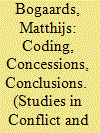

|
|
|
| 2 |
ID:
138172
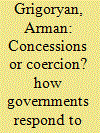

|
|
|
|
|
| Summary/Abstract |
When do newly independent states employ coercive measures against restive ethnic minorities within their borders rather than offer them concessions? The more vulnerable a state is to a particular minority’s bid for secession, the more likely it is to use coercion against that minority.
|
|
|
|
|
|
|
|
|
|
|
|
|
|
|
|
| 3 |
ID:
114811
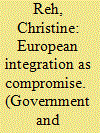

|
|
|
|
|
| Publication |
2012.
|
| Summary/Abstract |
The role of compromise in EU politics has been widely recognized by scholars and practitioners alike. At the same time, the systematic conceptual, analytical and normative study of compromise has remained an exception. This is surprising, given that the study of compromise can be linked to three broader questions at the heart of integration: (1) How does the EU accommodate diversity? (2) What makes supranational rule normatively justifiable? (3) Who or what defines the limits of cooperation? Against this backdrop, this article sheds light on the concept of compromise, on the role of compromise in legitimizing supranational governance and on the limits to compromise in the European polity. I argue that the EU - a divided, multilevel and functionally restricted polity - is highly dependent on the legitimizing force of 'inclusive compromise', which is characterized by the recognition of difference. This is true for horizontal or micro-level relations between political actors (where compromise works through concessions as well as justification, perspective-taking and empathic concern in a process of 'procedural accommodation'), and for vertical or macro-level relations between systems of governance (where compromise works through 'constitutional compatibility'). Given the legitimizing force of inclusive compromise, I subsequently identify the limits to such agreements and, thus, to supranational cooperation; I argue that these limits are issue specific and depend on where the costs of cooperation are borne. The article concludes by outlining routes for follow-up empirical research.
|
|
|
|
|
|
|
|
|
|
|
|
|
|
|
|
| 4 |
ID:
121829
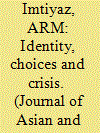

|
|
|
|
|
| Publication |
2013.
|
| Summary/Abstract |
This study attempts to understand the choices made by Muslim political leaders in general, and after independence in particular. Muslim leadership has been broadly classified into two categories based on their respective agendas. This paper looks critically at the choices made by Muslim leaders, as well as some state concessions that could have contributed to growing Islamic fundamentalism. It finally suggests some measures to the current problems of (North and East) Muslims: socio-economic concessions and local power-sharing.
|
|
|
|
|
|
|
|
|
|
|
|
|
|
|
|
| 5 |
ID:
146659
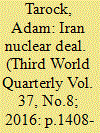

|
|
|
|
|
| Summary/Abstract |
Iran’s nuclear programme had for more than a decade become a controversial issue between Iran and the West; it had even threatened to develop into a military confrontation between Teheran and its arch adversary, Washington. The issue was finally resolved in an agreement, after more than a year of negotiations, between the two sides in Geneva in July 2015. This was hailed as a ‘breakthrough’ and a ‘win-win’ for both parties. It is argued here that the nuclear deal has made Iran’s nuclear programme almost inoperable, and pointed out that many members of Congress are vehemently against the deal; the next administration may not honour it or may revise it. The high costs of sanctions against Iran to the sanctioning countries are also examined, with a comparison made between the meagre concessions that Iran will get and the huge concessions that the West will receive under the deal. Furthermore, Iran has acceded to very intrusive inspection of some of its military sites. It is contended that, if the Iranians hope the agreement will soon bring about the resolution of other thorny regional and international issues that exist between Teheran and Washington, they are very likely to be disappointed.
|
|
|
|
|
|
|
|
|
|
|
|
|
|
|
|
| 6 |
ID:
167453
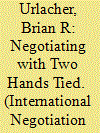

|
|
|
|
|
| Summary/Abstract |
Theories of conflict resolution often posit unified actors as a simplifying assumption. In practice conflict actors often struggle to balance competing factions and centers of power. Schelling and Putnam have argued that factors that constrain what a negotiator can accept are a potential source of leverage in a bargaining process, yet a counter argument suggests that leaders seeking to negotiate, while facing divided government, may be less able to credibly signal their intentions. Drawing on event data from nearly 3,000 conflict-months, this paper analyzes the frequency of concessions offered by both rebels and governments. This study finds evidence that a fractured decision-process results in both rebels and governments making more concessions. Further corroboration is provided through a case study of the Philippine government’s efforts to negotiate an end to the conflict in the Mindanao region.
|
|
|
|
|
|
|
|
|
|
|
|
|
|
|
|
| 7 |
ID:
098410
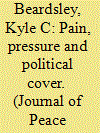

|
|
|
|
|
| Publication |
2010.
|
| Summary/Abstract |
This article explores the effect of domestic and international politics on the choice of mediation as a conflict management strategy in international crises. Existing work has yet to fully explore how domestic and international audiences shape the combatants' preferences for mediation. With regard to domestic pressures, combatants often desire mediation as political cover for unpalatable concessions. That is, intermediaries might obscure responsibility for disappointing outcomes or signal the prudence of compromise. In terms of international audiences, affected third parties eager to shape the resolution outcome might lobby to serve as a mediator. Since both domestic and international audiences are affected by the crisis severity, the article also explores how the pain of fighting conditions the effect of international and domestic political pressures. Empirical analysis of international crises since World War I confirms that potential domestic audience costs for seeking peace and the propensity for concessions positively affect the probability of mediation. Less clear is the role of third-party incentives; the results indicate that a higher potential for neighboring-state intervention actually decreases the likelihood of mediation. Consistent with previous studies, conflict costs increase mediation incidence, and the findings also indicate that at high costs of conflict, states appear in less need of political cover for making concessions.
|
|
|
|
|
|
|
|
|
|
|
|
|
|
|
|
| 8 |
ID:
165677


|
|
|
|
|
| Summary/Abstract |
This article examines the forces that encourage targets and challengers involved in claim disputes to offer concessions first. Our framework focuses upon reputation and pressure as key forces that can influence concession-making by claim dispute targets and challengers. We argue that past concession behavior both inside and outside of a claim dyad influences the willingness to make concessions, but does so in distinct ways. We also argue that pressure arising from internal conflict within the disputants and from major power involvement in managing the dispute, also influences the occurrence of concession-making. The results of our hazard analysis show that states involved in claim disputes do consider their opponent’s previous concession-making behavior. Our findings point clearly to the history of concessions within the dyad as a key influence on subsequent concession-making and that major power involvement increases the likelihood of concession-making by both challengers and targets.
|
|
|
|
|
|
|
|
|
|
|
|
|
|
|
|
| 9 |
ID:
186388
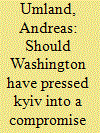

|
|
|
|
|
| Summary/Abstract |
This article was submitted in late 2021, and became dated after Russia's demonstrative preparation as well as start of an open, large-scale invasion of Ukraine early 2022. We nevertheless publish this commentary here in order to document the debate about the events leading to the escalation. No adaptations to the original 2021 article were made after the outbreak of high-intensity war on 24 February 2022. Avoiding a larger military escalation in the Russian–Ukrainian conflict is an important aim. Yet, historical experience suggests that concessions by Ukraine or its Western partners toward Russian revanchist aspirations in the Donbas may not help achieve it. On the contrary, Western softness, and Ukrainian weakness vis-à-vis the Kremlin will lead to further confrontation.
|
|
|
|
|
|
|
|
|
|
|
|
|
|
|
|
| 10 |
ID:
061486
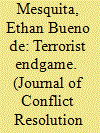

|
|
|
| 11 |
ID:
128986
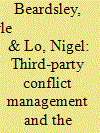

|
|
|
|
|
| Publication |
2014.
|
| Summary/Abstract |
Third-party conflict management, particularly legal dispute resolution (arbitration and adjudication) and mediation, can help improve the willingness of disputants to make asymmetric concessions by ameliorating commitment problems and providing political cover. In both regards, and especially pertaining to commitment problems, mediation has substantial limitations when compared to legal dispute resolution. We develop these arguments and test the observable implications on the Issue Correlates of War data. To get traction on the mechanisms at work, we distinguish between challenger concessions and defender concessions, positing that challenger concessions face the primary hurdle of political cover while defender concessions face the primary hurdle of commitment problems. We find that legal dispute resolution strongly increases the propensity for concessions by both challengers and targets, even major asymmetric concessions. Mediation, on the other hand, only helps increase minor challenger concessions. Also consistent with expectations, mediation best enables asymmetric challenger concessions in the highly salient cases that need the most political cover, and legal dispute resolution best enables asymmetric concessions when there has been a history of failed conflict management attempts that perpetuate mistrust.
|
|
|
|
|
|
|
|
|
|
|
|
|
|
|
|
|
|
|
|
|